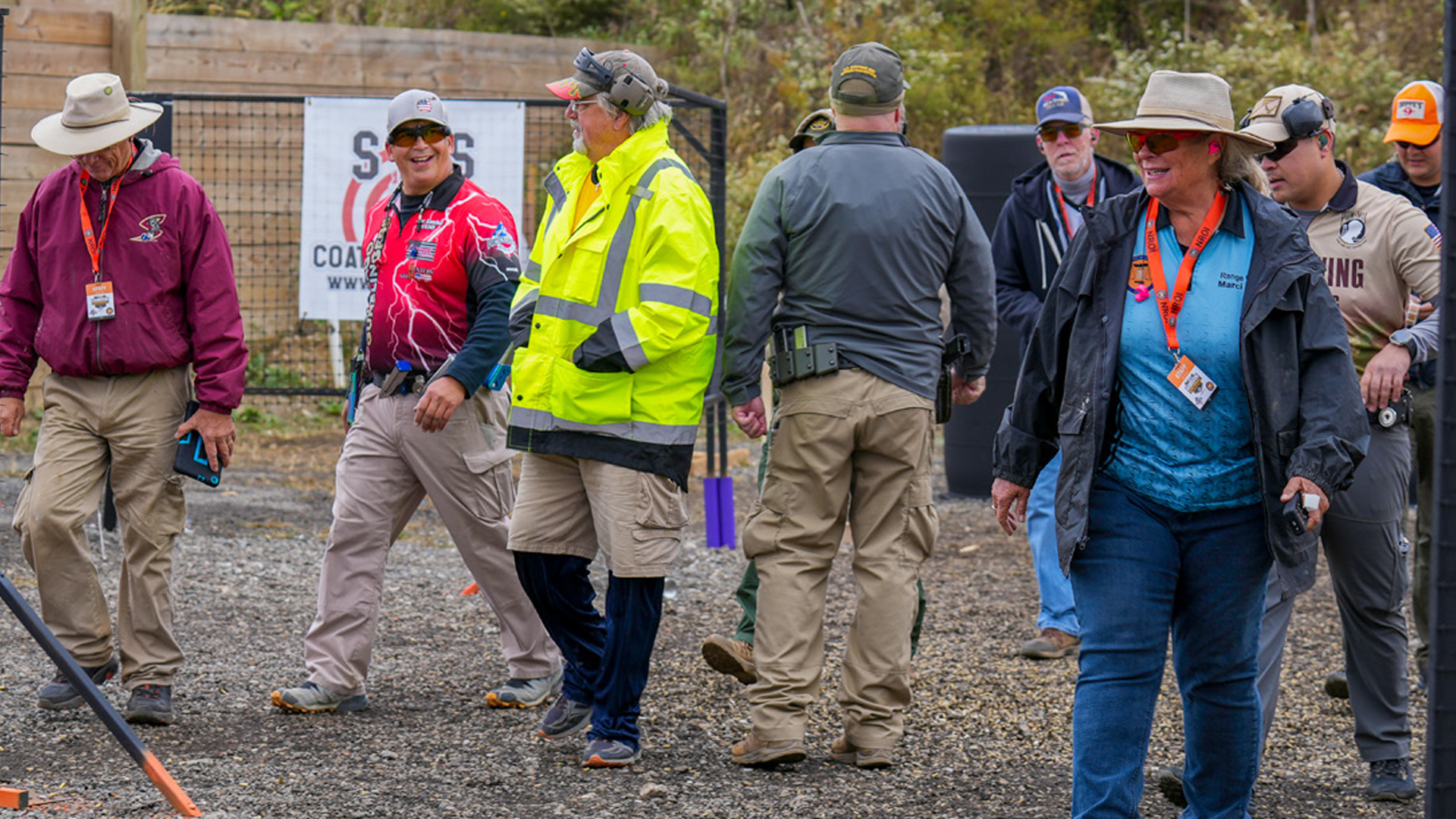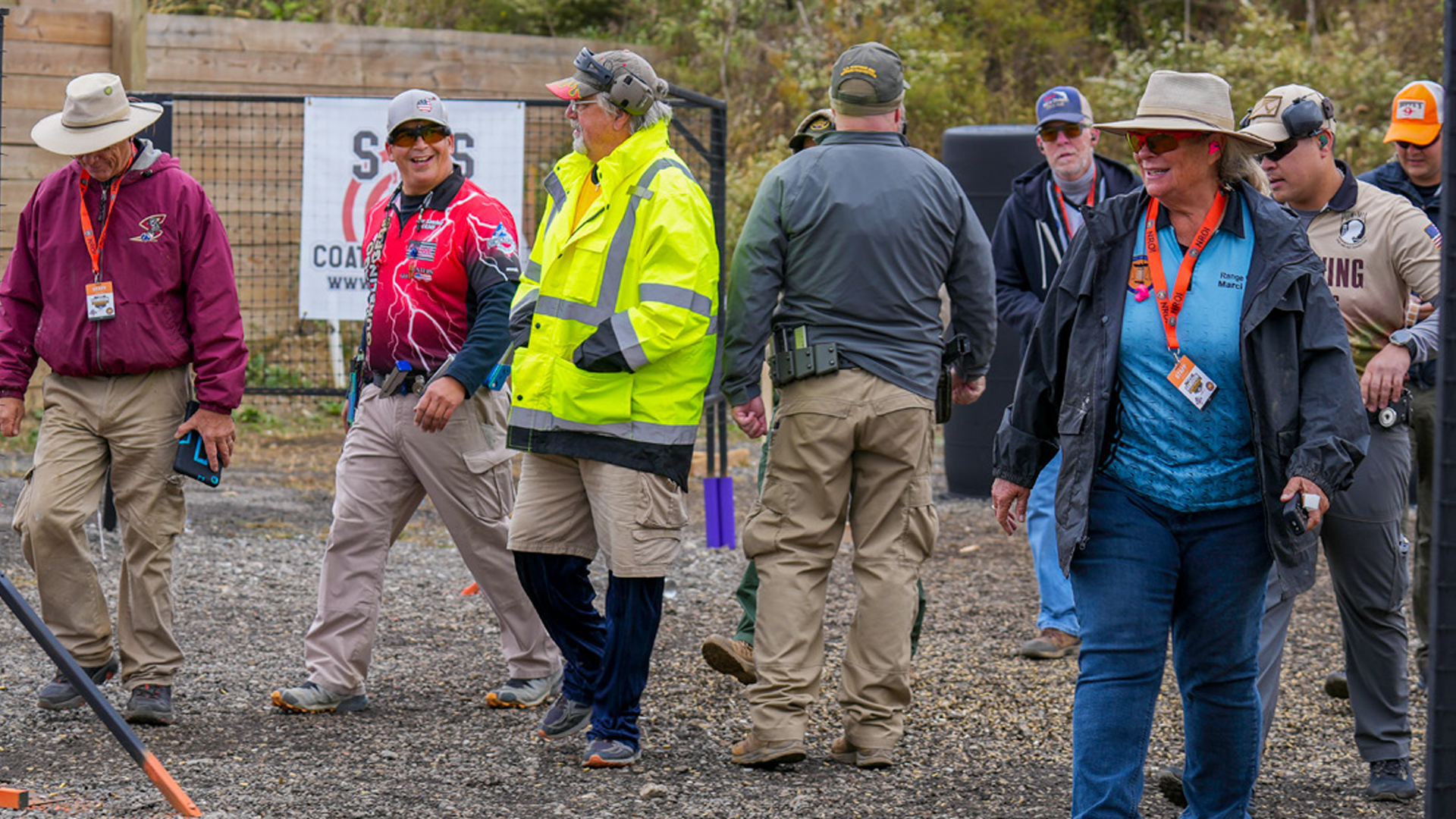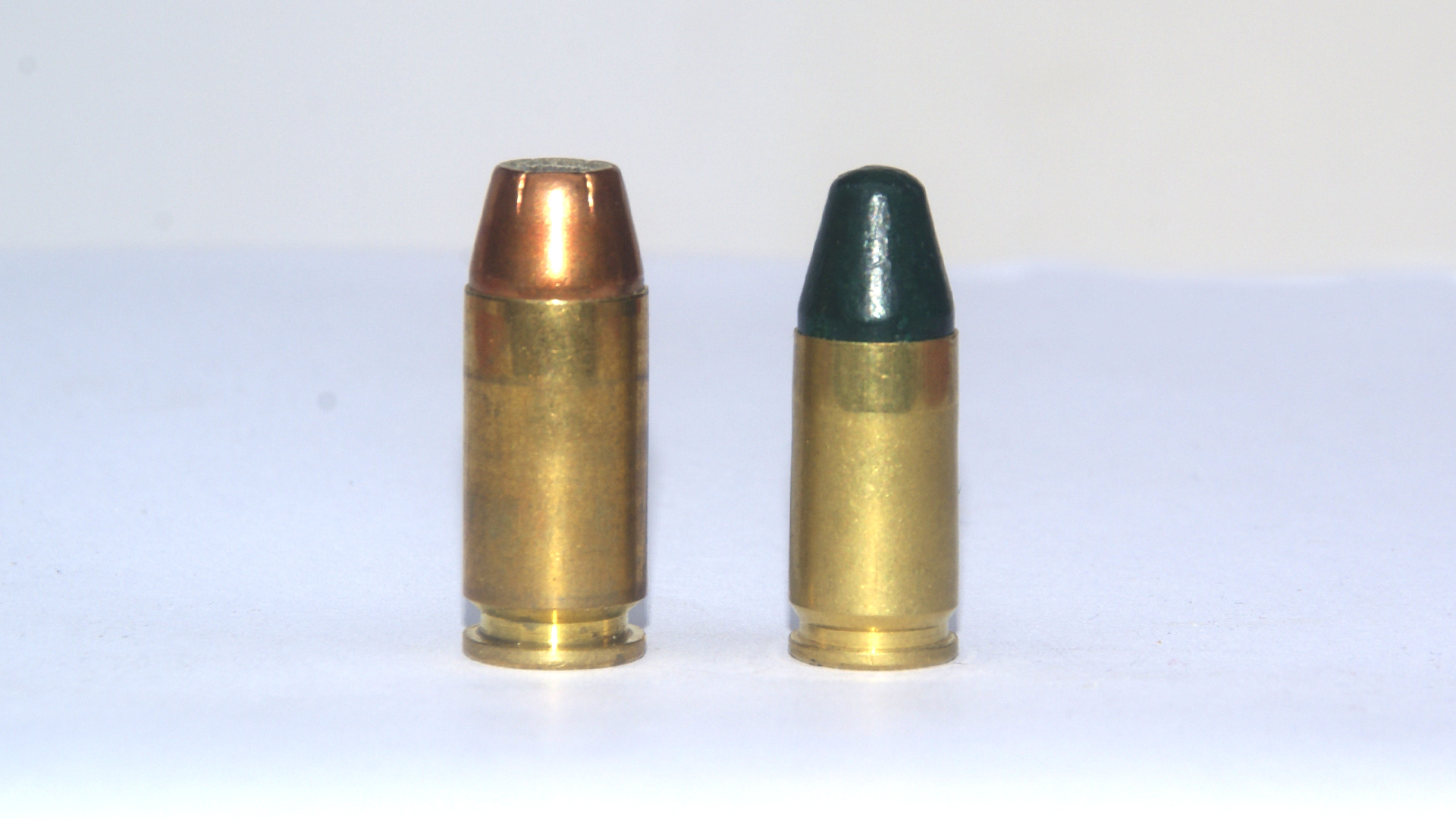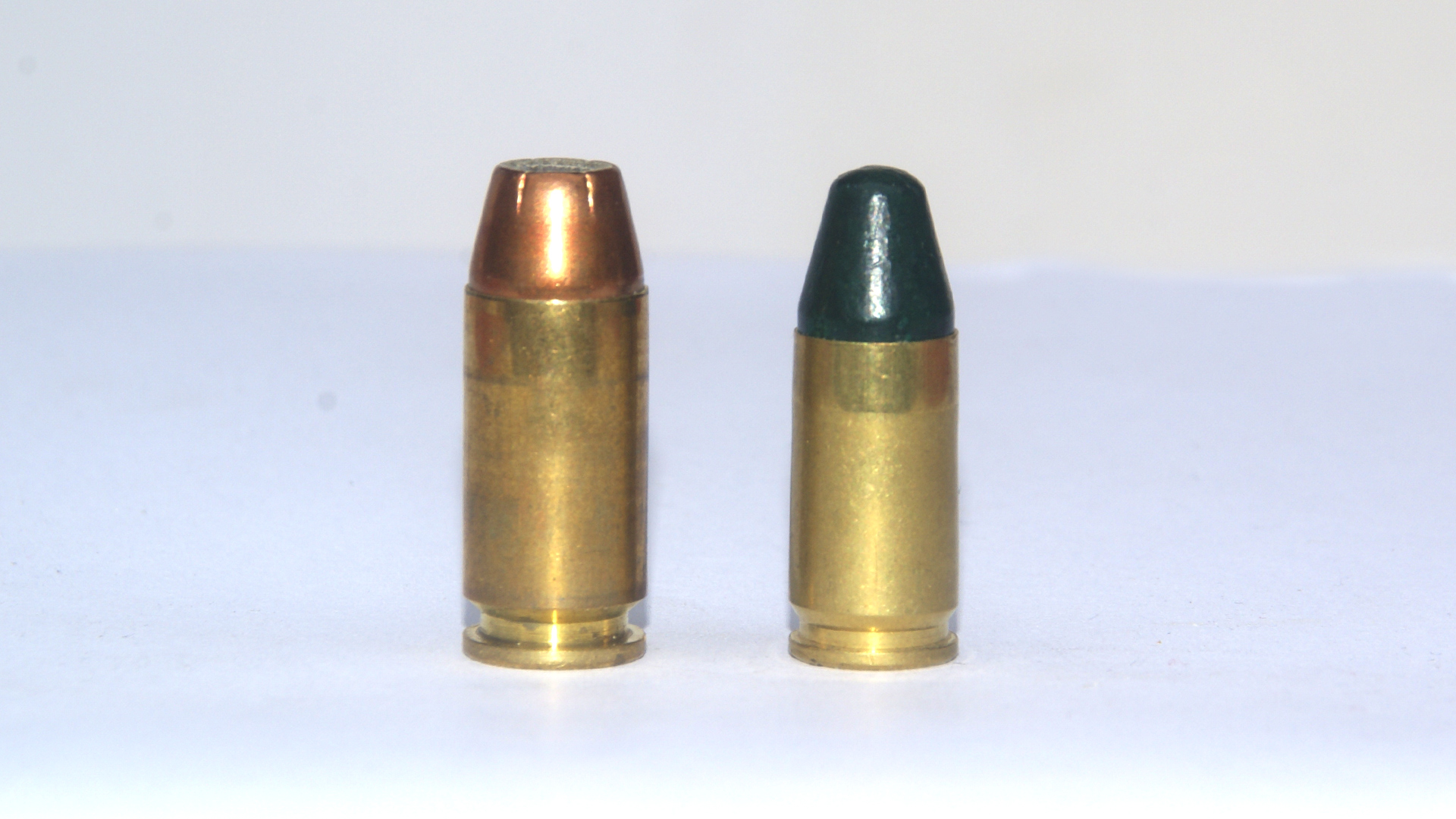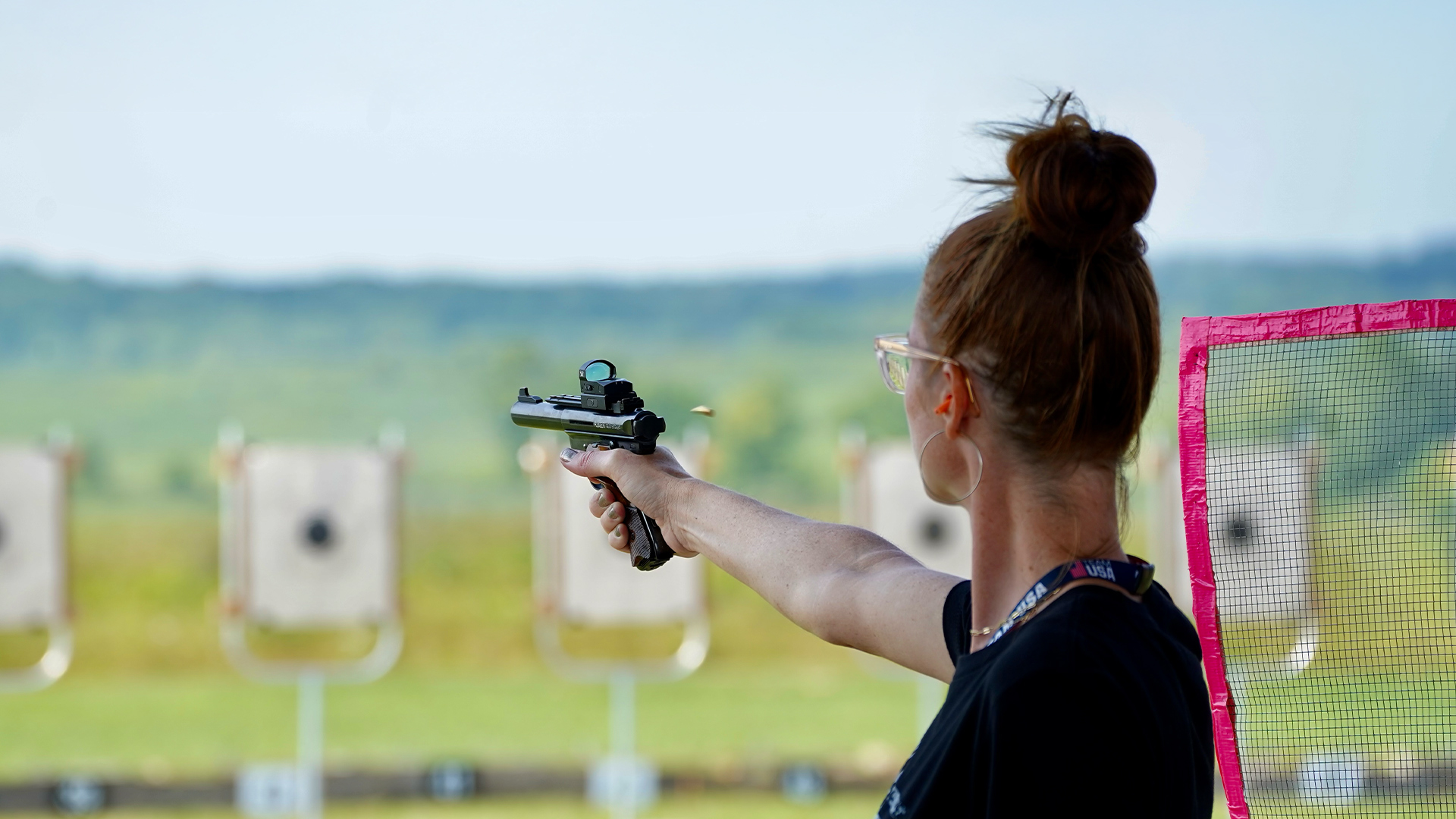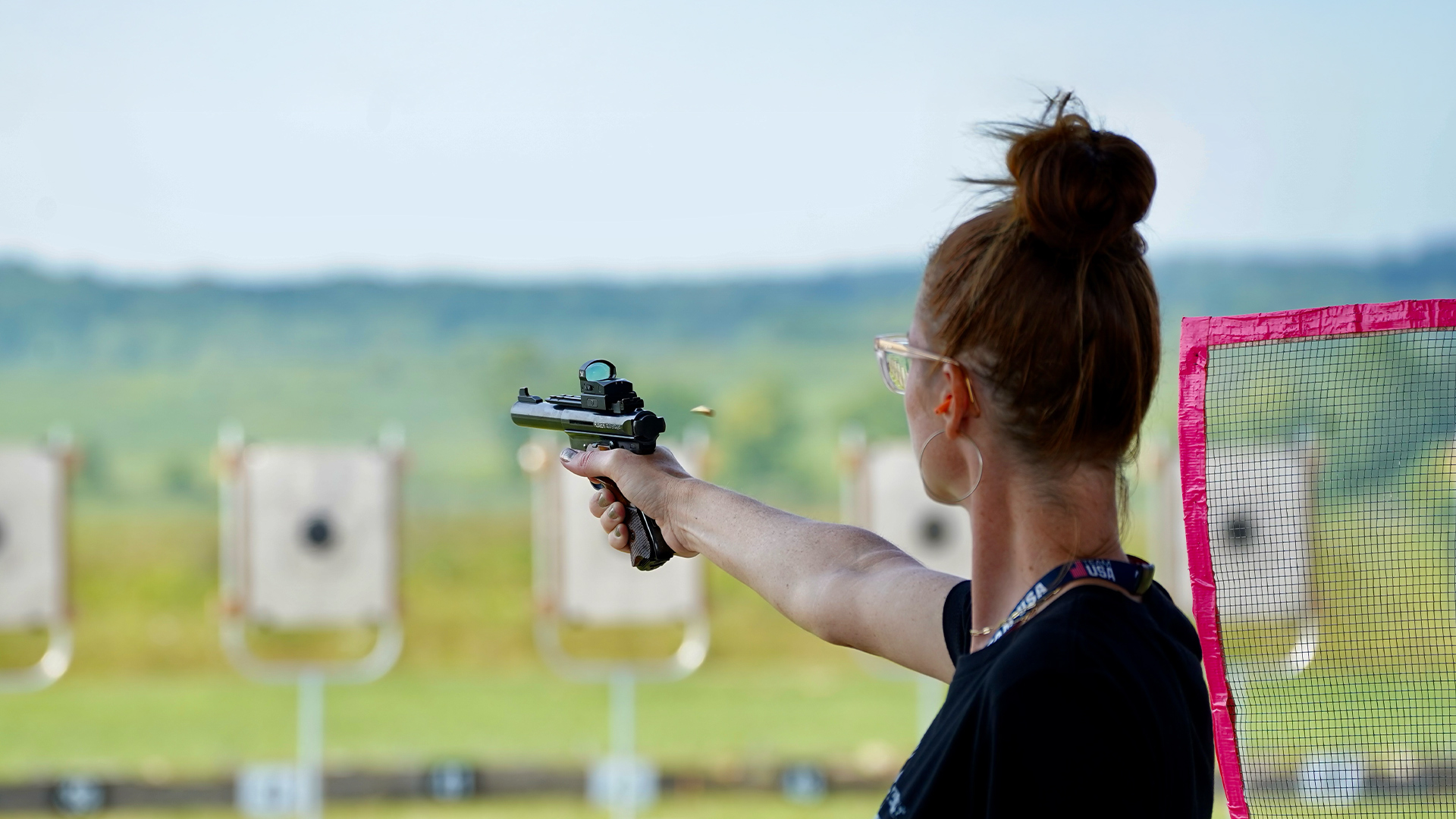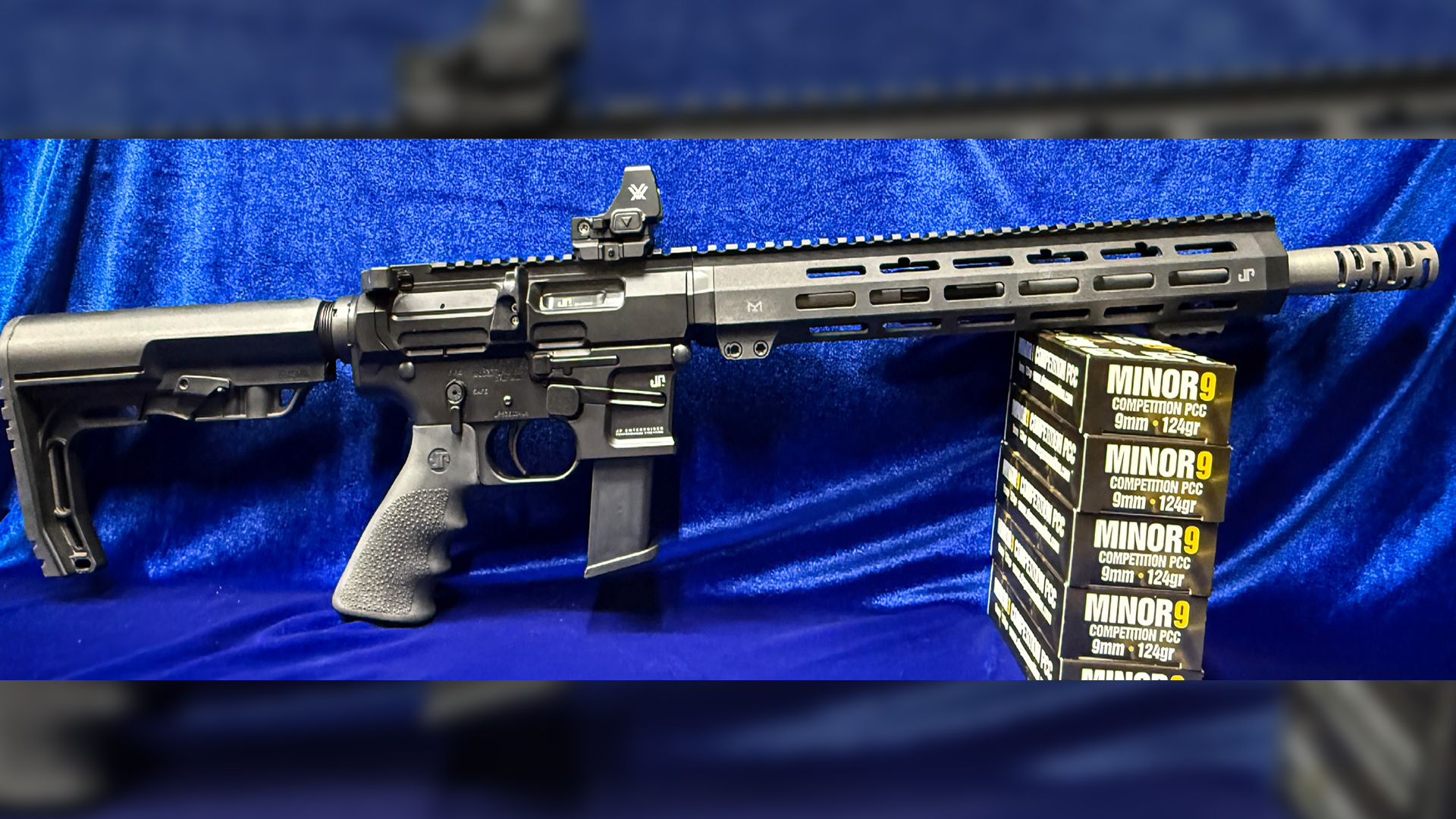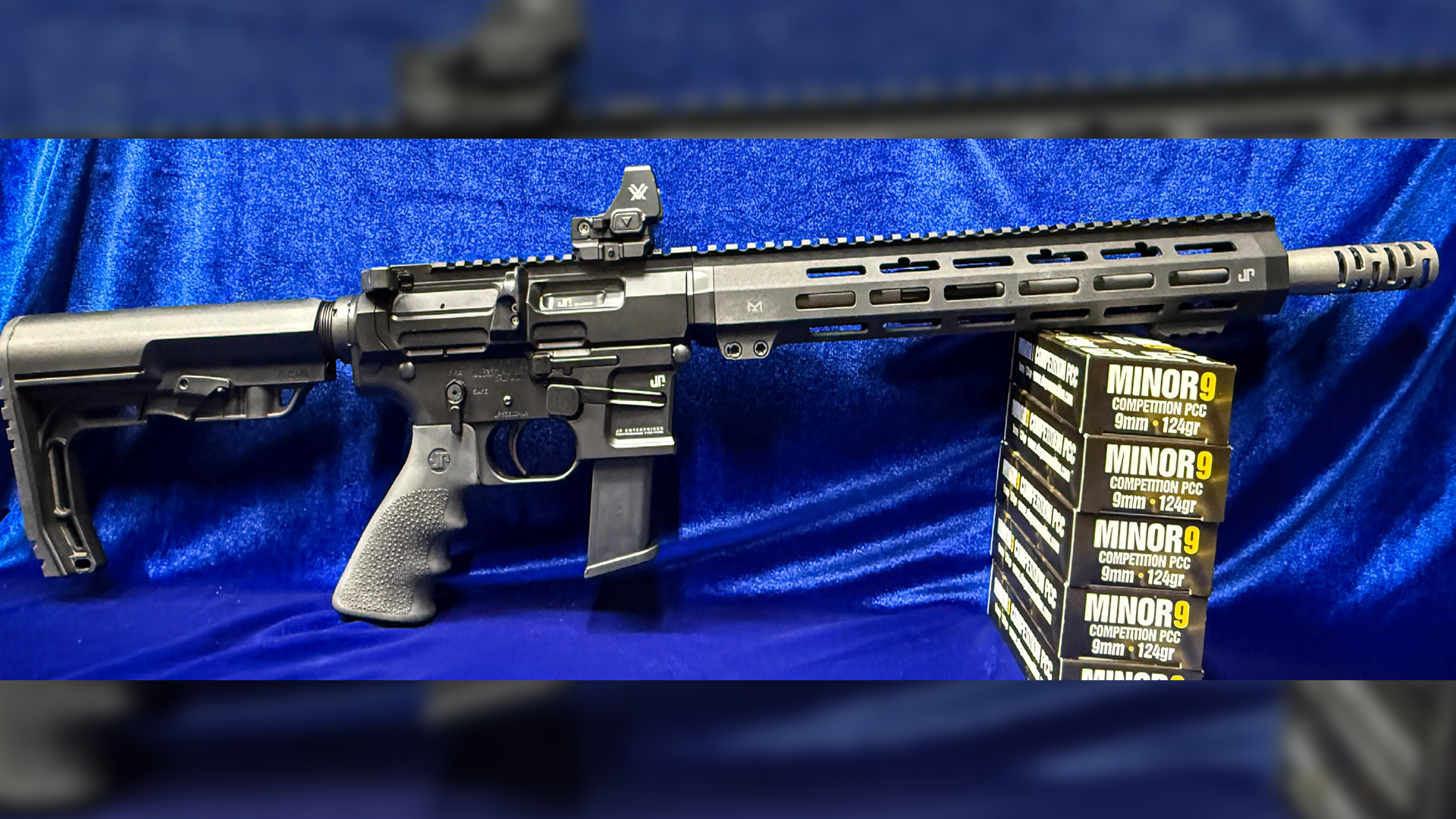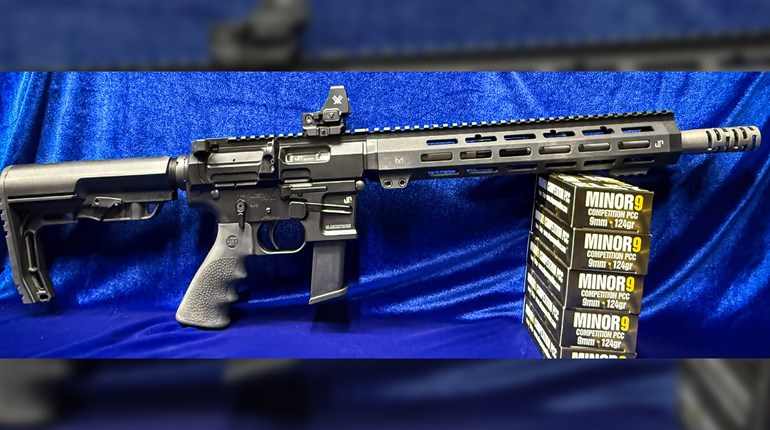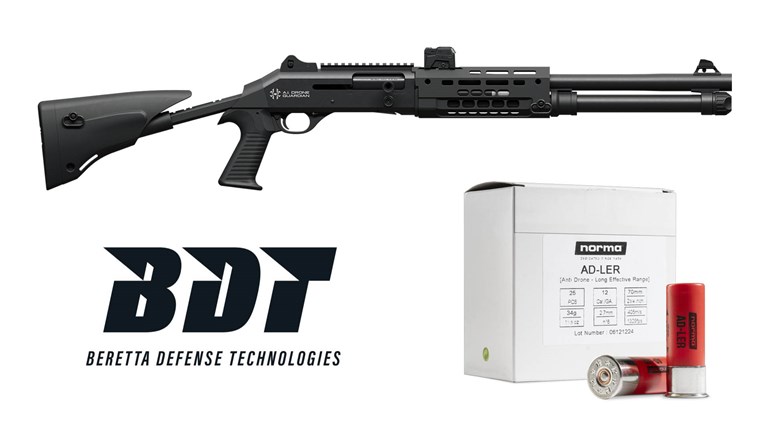
Walther has taken everything that is great with the PPQ pistol, the ergonomics and the amazing trigger, and built it into a steel frame competition gun. The PPQ Q5 Match SF (MSRP: $1,499) has just raised the bar on what a striker-fired competition gun can be. Range-ready out of the box, the Q5 Steel Frame is a 42-ounce, optics- and race-ready handgun destined for podium finishes.

I was invited to participate in a release event for this gun in Tulsa, OK. Now I have been excited about a lot of things—birth of a kid, new car, buying a house and the first time attending an R-rated movie—but this was really special! I have been excited about this ever since I got a chance to hold a 3D-printed model a year ago. During the event, Cody Osborn, the marketing manager for Walther USA, took us through the presentation of the new PPQ Q5 Match Steel Frame as well as the new accessories that will be available for it.
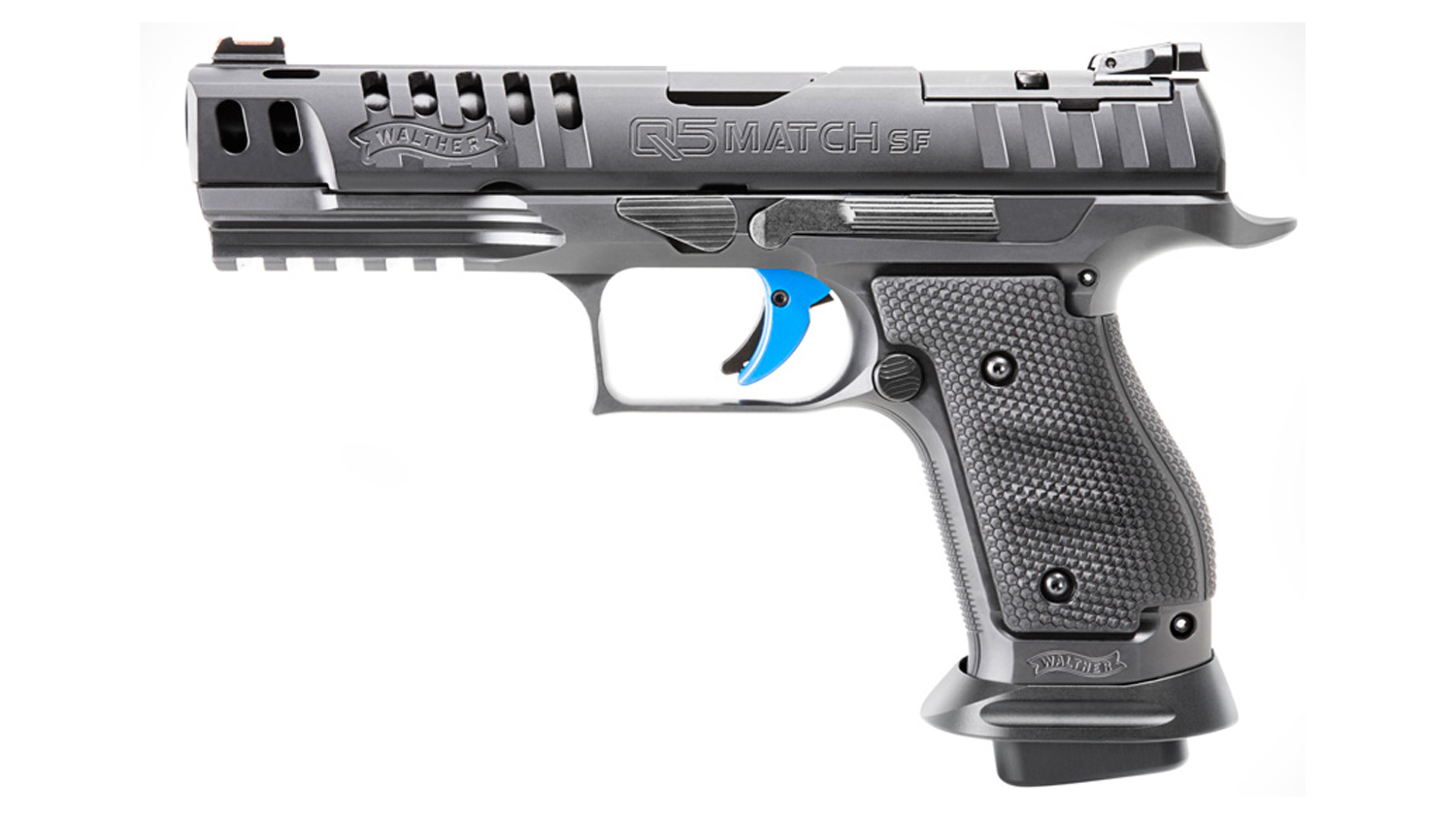
Chad Stanton runs the local USPSA Match at the USSA Range in Tulsa and is also the newest member of Team Walther. Many of the team members were present to help assist the gun media folks through the demo bays. There were four bays set up with new guns on each bay and boxes of Federal Syntech Action Pistol 9mm ammo. Bay 1 had two tables set up, each having three targets in a “El Prez” configuration with guns available to try out. Bay 2 had three targets staggered at seven, 15 and 25 yards to get in some distant shooting and try out the accuracy of the match-grade barrels. Bay 3 had three tables set up with steel targets downrange of each, two 8-inch plates and one full-size USPSA target. Finally, Bay 4 had a 20-round USPSA course of fire that you could run through.
I made sure that I was there early to help and be first in line to shoot. I started on the USPSA stage that Chad and teammate Loren Pendergrass were running. Just picking up the gun, the weight, the feel—you could instantly tell that you were holding something different. It is not just a steel frame that has been added to an existing model. This is a completely new gun.

We hear a lot about German engineering and ergonomics and the marketing that goes behind those phrases. Sometimes they are just that, a catchphrase to get you interested in buying something. The Walther engineers took all of their experience in building international target pistols and applied it to the design of this gun, understanding that this is a competition race gun. For example, this is a striker-fired pistol with a beavertail; it is not there to eliminate hammer bite, but to allow a competitor’s hand to get as high upon the grip as it can. They understand that we want this gun to shoot fast and flat and that a high grip is needed to accomplish it.
How a gun feels in your hand is as much about the grip and where everything is placed as it is about how the firearm balances. Just adding weight to a gun can be as much a positive as it can be a negative. The weight has to be in the right places and how it recoils with the additional weight is very important. I have picked up nose-heavy guns, or guns where someone has added a bunch of weight to the grip or a heavy magwell, and I have not been impressed. The weight was in the wrong part of the gun, and while some of that can be subjective to the user, I have seen guns nosedive in recoil, or not shoot as flat with added grip weight. It was obvious to me that Walther engineers spent a lot of time making sure this Q5 is balanced.

Comparing the final model to images that I had seen shows where additional machine work was done to the extended dustcover—not to just make it look pretty (which is does) but to balance the weight from front to back. Additionally, this model comes with a steel guide rod, compared to the plastic one with the polymer-framed PPQ.
One of the features on the polymer model is the interchangeable backstraps; the steel frame model will allow for the grip panels and backstrap to be interchangeable. There will be different sizes available with different textures. Furthermore, the magwell is removable to keep the gun Production and Carry Optics legal. The plus-2 basepads that come with the three supplied magazines fit perfectly with the magwell, as do the TTI plus-5. The Taylor Freelance plus-6 basepads do not, so if you are thinking 3-Gun or Limited minor and leaving the magwell, you will want to make sure that you have the right basepads.

One of the only things that is the same or similar between the polymer model and the steel frame is the slide. The Q5 Match comes optics-ready and ships with three plates for the most popular red dot sights. It has an LPA adjustable rear sight that is part of the removable plate and fiber optic front sight. The front sight is easy to remove by simply unscrewing it from the slide. I do not have cowitnessed sights on my Carry Optics gun.
The slide has generous lightening holes and wide serrations to make it very easy to manipulate when loading. (It also makes it look really cool, which is very important.) Besides being cool, the weight of the slide is important especially when adding an optic. The top of the slide is flattened and serrated as well.
The takedown is different on the steel frame, which now has a lever that rolls up when the slide is locked to the rear. This is to accommodate a larger and strengthened locking block on the steel frame. The bottom lug on the barrel has also been beefed up in the steel frame model. The frame is full length and has the customary Picatinny rail to accommodate lights and lasers. When you have steel, you can do cool things like checker the front strap of the frame. This is done at 25 lpi, with full serrations covering the entire front strap.
The front of the trigger guard is squared like the polymer model but has matching checkering. The magazine release is of the same size and shape as the polymer frame with serrations cut into the surface.

It looks amazing, just like a custom-built gun from a high-end competition gunsmith. So how does it shoot? Just like it looks. The Q5 Steel Frame has the same great trigger that the polymer line of PPQs is known for. The gun sits in the hand like it was made to be there and shoots extremely flat. It is very well balanced and the sights return very quickly with each follow-up shot. Tracy Whitsell was in attendance, a fitness model and shooter. She was ripping off .16 splits average when she went through the USPSA stage.
The polymer-framed Q5s and my 4-inch model have been very accurate guns, and I expected the steel fame to be the same. It did not disappoint. On the 25-yard USPSA target I was easily putting 10 rounds of the 150-grain Action Pistol ammunition into the upper A/B zone of the target with iron sights.

Of the 10 new steel frame guns that were used, the model that Bret Vorhees, director of product development for Walther, had a Trijicon RMR on it. I ran several magazines of the Federal Syntech ammo through this model on the bay with the steel targets. I was able to quickly transition between the two 8-inch plates and the full-size USPSA steel target with no problems.
This game isn’t just about being able to shoot a gun fast, you have to be able to move it between targets fast and have it ready to shoot when that flash sight picture is ready. I think that there is a balance between the weight of a gun to be able to transition quickly and one that is too heavy to stop when you need to shoot. Some of that is subjective, and someone who can muscle a 3-pound gun around with no problems might like that. Add the weight of a loaded magazine and you are waving about 3.5 pounds out there, closer to four if you are shooting Carry Optics.
My Single Stack and Limited guns all weight 40 to 42 ounces. You know what else weighs 2.51 pounds? Yeah, JMB might have just nailed the proper weight of a handgun (along with just about everything else) with the 1911. Likewise, the Walther PPQ Q5 Steel Frame is the ideal weight. Further, base pads and adding a red dot do not put it over the 45 ounces Carry Optics weight limit, so it has that going for it, which is nice.
The Quick Defense trigger is one of the best out-of-the-box, striker-fired triggers on the market and is unchanged in the steel-frame PPQ. There are going to be aftermarket disconnector springs that will change the pre-travel and reset; if you want it a little lighter or, in the case of it being your carry gun and want it heavier, these will soon be available. They will also be compatible with the polymer-frame models. Also, the removable magwell that comes with the PPQ Q5 Match Steel Frame will be available and work on the polymer frame guns.

The “Win with Walther” program that started two years ago gets an overhaul for 2019. If you are not familiar with the contingency program, it is pretty simple—shoot a Walther, win and get paid. In 2017, they rolled out the program with $400,000 up for grabs for USPSA and IDPA matches. In 2018, they increased it to $450,000 and added several Level 2-sanctioned USPSA matches. This is real money—even a hack like me pulled out a $1,250 check for winning A Class at Area 3.
For 2019, the USPSA Nationals and Area matches will continue to be recognized, but what is new is that any sanctioned Level 2 or 3 USPSA match can now be recognized for payout. It will be based on the total number of competitors in the match and the number of competitors in Production, Carry Optics and Limited Divisions.
Walther is no longer the “it has a great personality” gun, this is the one you want to take home. The new PPQ Q5 Match Steel Frame and the support that Walther is putting behind it will continue to make strides in the competition world. This time, instead of small steps it just took a giant leap!
Article from the January/February 2019 issue of USPSA’s FrontSight magazine.
More action shooting articles:

The new Walther PPQ Q5 Match Steel Frame.
I was invited to participate in a release event for this gun in Tulsa, OK. Now I have been excited about a lot of things—birth of a kid, new car, buying a house and the first time attending an R-rated movie—but this was really special! I have been excited about this ever since I got a chance to hold a 3D-printed model a year ago. During the event, Cody Osborn, the marketing manager for Walther USA, took us through the presentation of the new PPQ Q5 Match Steel Frame as well as the new accessories that will be available for it.

“Walther has taken everything that is great with the PPQ pistol, the ergonomics and the amazing trigger, and built it into a steel-frame competition gun.”
Chad Stanton runs the local USPSA Match at the USSA Range in Tulsa and is also the newest member of Team Walther. Many of the team members were present to help assist the gun media folks through the demo bays. There were four bays set up with new guns on each bay and boxes of Federal Syntech Action Pistol 9mm ammo. Bay 1 had two tables set up, each having three targets in a “El Prez” configuration with guns available to try out. Bay 2 had three targets staggered at seven, 15 and 25 yards to get in some distant shooting and try out the accuracy of the match-grade barrels. Bay 3 had three tables set up with steel targets downrange of each, two 8-inch plates and one full-size USPSA target. Finally, Bay 4 had a 20-round USPSA course of fire that you could run through.
I made sure that I was there early to help and be first in line to shoot. I started on the USPSA stage that Chad and teammate Loren Pendergrass were running. Just picking up the gun, the weight, the feel—you could instantly tell that you were holding something different. It is not just a steel frame that has been added to an existing model. This is a completely new gun.

Loren Pendergrass with the Walther PPQ Q5 Match SF.
We hear a lot about German engineering and ergonomics and the marketing that goes behind those phrases. Sometimes they are just that, a catchphrase to get you interested in buying something. The Walther engineers took all of their experience in building international target pistols and applied it to the design of this gun, understanding that this is a competition race gun. For example, this is a striker-fired pistol with a beavertail; it is not there to eliminate hammer bite, but to allow a competitor’s hand to get as high upon the grip as it can. They understand that we want this gun to shoot fast and flat and that a high grip is needed to accomplish it.
How a gun feels in your hand is as much about the grip and where everything is placed as it is about how the firearm balances. Just adding weight to a gun can be as much a positive as it can be a negative. The weight has to be in the right places and how it recoils with the additional weight is very important. I have picked up nose-heavy guns, or guns where someone has added a bunch of weight to the grip or a heavy magwell, and I have not been impressed. The weight was in the wrong part of the gun, and while some of that can be subjective to the user, I have seen guns nosedive in recoil, or not shoot as flat with added grip weight. It was obvious to me that Walther engineers spent a lot of time making sure this Q5 is balanced.

The PPQ Q5 Match Steel Frame shoots as amazing as it looks.
Comparing the final model to images that I had seen shows where additional machine work was done to the extended dustcover—not to just make it look pretty (which is does) but to balance the weight from front to back. Additionally, this model comes with a steel guide rod, compared to the plastic one with the polymer-framed PPQ.
One of the features on the polymer model is the interchangeable backstraps; the steel frame model will allow for the grip panels and backstrap to be interchangeable. There will be different sizes available with different textures. Furthermore, the magwell is removable to keep the gun Production and Carry Optics legal. The plus-2 basepads that come with the three supplied magazines fit perfectly with the magwell, as do the TTI plus-5. The Taylor Freelance plus-6 basepads do not, so if you are thinking 3-Gun or Limited minor and leaving the magwell, you will want to make sure that you have the right basepads.

One of the only things that is the same or similar between the polymer model and the steel frame is the slide. The Q5 Match comes optics-ready and ships with three plates for the most popular red dot sights. It has an LPA adjustable rear sight that is part of the removable plate and fiber optic front sight. The front sight is easy to remove by simply unscrewing it from the slide. I do not have cowitnessed sights on my Carry Optics gun.
The slide has generous lightening holes and wide serrations to make it very easy to manipulate when loading. (It also makes it look really cool, which is very important.) Besides being cool, the weight of the slide is important especially when adding an optic. The top of the slide is flattened and serrated as well.
The takedown is different on the steel frame, which now has a lever that rolls up when the slide is locked to the rear. This is to accommodate a larger and strengthened locking block on the steel frame. The bottom lug on the barrel has also been beefed up in the steel frame model. The frame is full length and has the customary Picatinny rail to accommodate lights and lasers. When you have steel, you can do cool things like checker the front strap of the frame. This is done at 25 lpi, with full serrations covering the entire front strap.
The front of the trigger guard is squared like the polymer model but has matching checkering. The magazine release is of the same size and shape as the polymer frame with serrations cut into the surface.

Baret Fawbush shooting the Q5 Match SF.
It looks amazing, just like a custom-built gun from a high-end competition gunsmith. So how does it shoot? Just like it looks. The Q5 Steel Frame has the same great trigger that the polymer line of PPQs is known for. The gun sits in the hand like it was made to be there and shoots extremely flat. It is very well balanced and the sights return very quickly with each follow-up shot. Tracy Whitsell was in attendance, a fitness model and shooter. She was ripping off .16 splits average when she went through the USPSA stage.
The polymer-framed Q5s and my 4-inch model have been very accurate guns, and I expected the steel fame to be the same. It did not disappoint. On the 25-yard USPSA target I was easily putting 10 rounds of the 150-grain Action Pistol ammunition into the upper A/B zone of the target with iron sights.

Of the 10 new steel frame guns that were used, the model that Bret Vorhees, director of product development for Walther, had a Trijicon RMR on it. I ran several magazines of the Federal Syntech ammo through this model on the bay with the steel targets. I was able to quickly transition between the two 8-inch plates and the full-size USPSA steel target with no problems.
This game isn’t just about being able to shoot a gun fast, you have to be able to move it between targets fast and have it ready to shoot when that flash sight picture is ready. I think that there is a balance between the weight of a gun to be able to transition quickly and one that is too heavy to stop when you need to shoot. Some of that is subjective, and someone who can muscle a 3-pound gun around with no problems might like that. Add the weight of a loaded magazine and you are waving about 3.5 pounds out there, closer to four if you are shooting Carry Optics.
My Single Stack and Limited guns all weight 40 to 42 ounces. You know what else weighs 2.51 pounds? Yeah, JMB might have just nailed the proper weight of a handgun (along with just about everything else) with the 1911. Likewise, the Walther PPQ Q5 Steel Frame is the ideal weight. Further, base pads and adding a red dot do not put it over the 45 ounces Carry Optics weight limit, so it has that going for it, which is nice.
The Quick Defense trigger is one of the best out-of-the-box, striker-fired triggers on the market and is unchanged in the steel-frame PPQ. There are going to be aftermarket disconnector springs that will change the pre-travel and reset; if you want it a little lighter or, in the case of it being your carry gun and want it heavier, these will soon be available. They will also be compatible with the polymer-frame models. Also, the removable magwell that comes with the PPQ Q5 Match Steel Frame will be available and work on the polymer frame guns.

Cody Osborn.
The “Win with Walther” program that started two years ago gets an overhaul for 2019. If you are not familiar with the contingency program, it is pretty simple—shoot a Walther, win and get paid. In 2017, they rolled out the program with $400,000 up for grabs for USPSA and IDPA matches. In 2018, they increased it to $450,000 and added several Level 2-sanctioned USPSA matches. This is real money—even a hack like me pulled out a $1,250 check for winning A Class at Area 3.
For 2019, the USPSA Nationals and Area matches will continue to be recognized, but what is new is that any sanctioned Level 2 or 3 USPSA match can now be recognized for payout. It will be based on the total number of competitors in the match and the number of competitors in Production, Carry Optics and Limited Divisions.
Walther is no longer the “it has a great personality” gun, this is the one you want to take home. The new PPQ Q5 Match Steel Frame and the support that Walther is putting behind it will continue to make strides in the competition world. This time, instead of small steps it just took a giant leap!
Article from the January/February 2019 issue of USPSA’s FrontSight magazine.
More action shooting articles:
- Reducing White Space For Better Accuracy
- Smith & Wesson M&P Competition Build
- 9 Things I Learned From My First USPSA Match
- Tips On How To Master Rimfire Red Dot Sights
- Glock G34 Generation 5 MOS For Carry Optics, Production
- IDPA Welcomes Optics
- Introduction To ICORE
- 10 Of Our Best Action Shooting Articles

